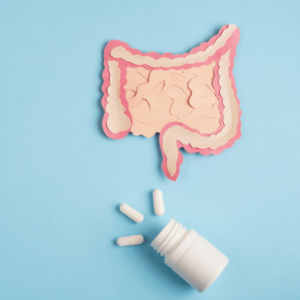Urinary Rescue: Rapid Relief is a fast-acting, natural blend of vitamin D, Vitamin B6, Potassium, Magnesium, D-Mannose, Sage, Hibiscus and Ginkgo Biloba extract designed to address active urinary discomfort and promote a healthy urinary tract.
Hibiscus
Extract of Hibiscus has been shown to inhibit the growth of Escherichia coli (E. coli), Klebsiella pneumoniae and Candida albicans (C. albicans) all cause UTIs [1,2].
Ginkgoenolic acid
Present in Ginkgo Biloba extract, is able to inhibit Escherichia coli and Staphylococcus aureus biofilm* formation [3].
Sage
This herb contains numerous beneficial compounds like Rosmarinic acid and Carnosic acid and luteolin. It has potent antioxidant and anti-inflammatory effects as well as reducing oxidative stress and modulating the immunological response thereby preventing organ damage [4]. Given these properties Sage, with its rich luteolin content, could offer potential benefits in managing UTIs.
Potassium Citrate
Helps to relieve the burning sensation associated with UTI by making the urine less acidic.
Magnesium
Urinary tract infections (UTI) lead to inflammation of the bladder lining. Bladder discomfort occurs because of involuntary contractions of the bladder smooth in response to this. For this reason people who present to their Doctor with overactive bladder symptoms are screened for UTIs. Magnesium is associated with smooth muscle relaxation and may help ease this discomfort [5].
Vitamin D
A systematic review of existing research, following PRISMA guidelines, confirms that maintaining serum 25(OH)D concentrations above 50 ng/mL significantly reduces the risk of viral and bacterial infections, sepsis (and autoimmunity) [6,11].
Vitamin B6
Plays a key role in metabolising proteins, fats, and carbohydrates, converting them into energy. It also supports a healthy immune system.
D-mannose
This simple sugar, is showing promise as a potential treatment for recurrent urinary tract infections (UTIs) [7]. It works by preventing bacteria, primarily E. coli, from adhering to the urinary tract lining [10]. Studies have shown that D-mannose can reduce the recurrence of UTIs, improve quality of life, and extend UTI-free periods [8]. These benefits contribute to an overall improvement in the quality of life for individuals suffering from recurrent UTIs [9]. D-mannose is well-tolerated with minimal side effects and represents a potential non-antibiotic approach to UTI prevention and management [7].
*Biofilm
A biofilm is a community of microorganisms, such as bacteria, that adhere to a surface and are encased in a self-produced extracellular polymeric substance (EPS) matrix. This matrix is a sticky, slimy substance composed of polysaccharides, proteins, and nucleic acids. These can be difficult to remove and may explain why some people are prone to recurrent infections where symptoms return soon after stopping antibiotics. Strategies to limit and remove biofilm are therefore an attractive target to prevent recurrent infections.
References
- Alshami I., Alharbi A.E. Antimicrobial activity of Hibiscus sabdariffa extract against uropathogenic strains isolated from recurrent urinary tract infections. Asian Pac. J. Trop. Dis. 2014;4:317–322. doi: 10.1016/S2222-1808(14)60581-8.
- Alshami I, Alharbi AE. Hibiscus sabdariffa extract inhibits in vitro biofilm formation capacity of Candida albicans isolated from recurrent urinary tract infections. Asian Pac J Trop Biomed. 2014 Feb;4(2):104-8. doi: 10.1016/S2221-1691(14)60217-3. PMID: 25182280; PMCID: PMC3819477.
- Lee JH, Kim YG, Ryu SY, Cho MH, Lee J. Ginkgolic acids and Ginkgo biloba extract inhibit Escherichia coli O157:H7 and Staphylococcus aureus biofilm formation. Int J Food Microbiol. 2014;174:47–55. doi: 10.1016/j.ijfoodmicro.2013.12.030.
- Vajdi M, Karimi A, Karimi M, Abbasalizad Farhangi M, Askari G. Effects of luteolin on sepsis: A comprehensive systematic review. Phytomedicine. 2023 May;113:154734. doi: 10.1016/j.phymed.2023.154734. Epub 2023 Feb 26. PMID: 36898254.
- Park JY, Hong JH, Kim DH, Yu J, Hwang JH, Kim YK. Magnesium and Bladder Discomfort after Transurethral Resection of Bladder Tumor: A Randomized, Double-blind, Placebo-controlled Study. Anesthesiology. 2020 Jul;133(1):64-77. doi: 10.1097/ALN.0000000000003309. PMID: 32304405.
- Wimalawansa SJ. Infections and Autoimmunity-The Immune System and Vitamin D: A Systematic Review. Nutrients. 2023 Sep 2;15(17):3842. doi: 10.3390/nu15173842. PMID: 37686873; PMCID: PMC10490553.
- Cooper TE, Teng C, Howell M, Teixeira-Pinto A, Jaure A, Wong G. D-mannose for preventing and treating urinary tract infections. Cochrane Database Syst Rev. 2022 Aug 30;8(8):CD013608. doi: 10.1002/14651858.CD013608.pub2. PMID: 36041061; PMCID: PMC9427198.
- Kyriakides R, Jones P, Somani BK. Role of D-Mannose in the Prevention of Recurrent Urinary Tract Infections: Evidence from a Systematic Review of the Literature. Eur Urol Focus. 2021 Sep;7(5):1166-1169. doi: 10.1016/j.euf.2020.09.004. Epub 2020 Sep 22. PMID: 32972899.
- De Nunzio C, Bartoletti R, Tubaro A, Simonato A, Ficarra V. Role of D-Mannose in the Prevention of Recurrent Uncomplicated Cystitis: State of the Art and Future Perspectives. Antibiotics (Basel). 2021 Apr 1;10(4):373. doi: 10.3390/antibiotics10040373. PMID: 33915821; PMCID: PMC8066587.
- Wawrysiuk S, Naber K, Rechberger T, Miotla P. Prevention and treatment of uncomplicated lower urinary tract infections in the era of increasing antimicrobial resistance-non-antibiotic approaches: a systemic review. Arch Gynecol Obstet. 2019 Oct;300(4):821-828. doi: 10.1007/s00404-019-05256-z. Epub 2019 Jul 26. PMID: 31350663; PMCID: PMC6759629.
- Wimalawansa SJ. Infections and Autoimmunity-The Immune System and Vitamin D: A Systematic Review. Nutrients. 2023 Sep 2;15(17):3842. doi: 10.3390/nu15173842. PMID: 37686873; PMCID: PMC10490553.




